The Best Butternut Squash Baby Food
Medically reviewed and cowritten by Jamie Johnson, Registered Dietitian Nutritionist (RDN), and Lauren Braaten, Pediatric Occupational Therapist (OT).
This homemade Roasted Butternut Squash Baby Food Puree is also a deliciously smooth way to introduce butternut squash to your baby! It’s a great Stage 1 baby food for 6 months and up!
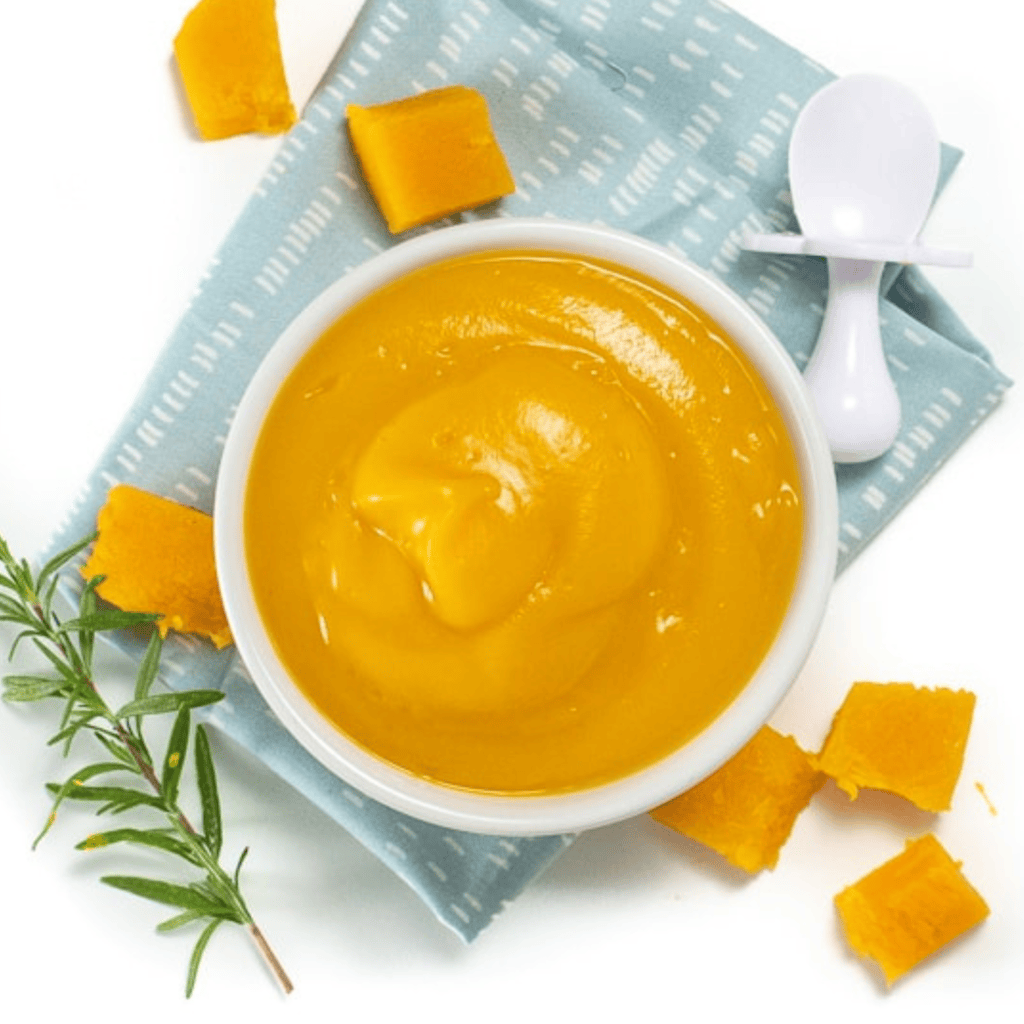
Butternut Squash Baby Food
This butternut squash puree is a quick and simple recipe that involves roughly 5 minutes of hands-on time! 🖐
We’ll let the oven do all the hard work for the rest of the prep time. Cuz why should we work harder 💪 when we can work smarter? 🙋♀️
- creamy and smooth
- great for 4-6+ months
- stage one baby food
- healthy — full of essential nutrients for your baby
- easy to make — requires only 5 minutes of hands-on time
- babies will love the sweet and earthy taste
- homemade
- freezer-friendly
- budget-friendly
Is it your first time making homemade baby food? Then I suggest you start this journey by reading my in-depth Guide on How to Make Homemade Baby Food. And make sure to check out my best-selling cookbook for even more information and recipes!
Butternut Squash Video
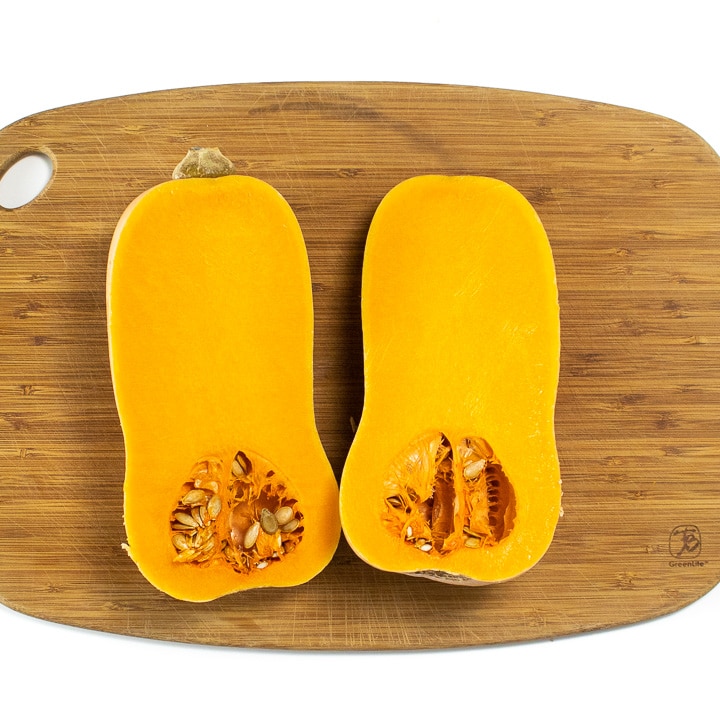
Health Benefits of Butternut Squash
- High levels of antioxidants and vitamins A and C, which boosts the immune system and reduces inflammation
- A good source of potassium that helps keep bones healthy
- Contains a protein that may be a potent anticancer agent
- Provides calcium to help strengthen bones and folate to help with brain development
Ingredients
Make sure to read the recipe card below for full ingredients and instructions!
- Butternut Squash: This is an easy-to-find, inexpensive, and nutritious food for your baby! When selecting butternut squash, look for a firm squash that has a solid beige color skin without bruising or damage marks. The insides will range from bright yellow to burnt orange, so don’t be alarmed if yours is somewhere in that color range.
- Thyme or Rosemary: We are kicking up the flavor profile with a fun and fresh herb — thyme or rosemary. Either of these herbs will tone down the earthiness of the squash and ramp up its freshness and citrus aspect. You can’t go wrong with either. But you can always skip adding herbs and spices to your baby food if you prefer (see more below).
Adding Healthy Fats Tip: If you are looking to add some extra healthy fat to your baby’s meals, then you can drizzle the butternut squash with extra virgin olive oil before roasting. Olive oil is a healthy fat that is full of omega 3 and omega 6 that helps baby absorb vitamin D which is important for bone growth and strengthening.
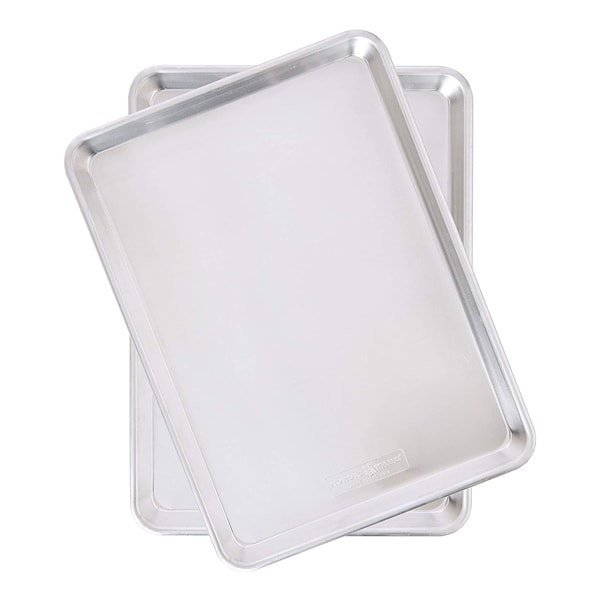
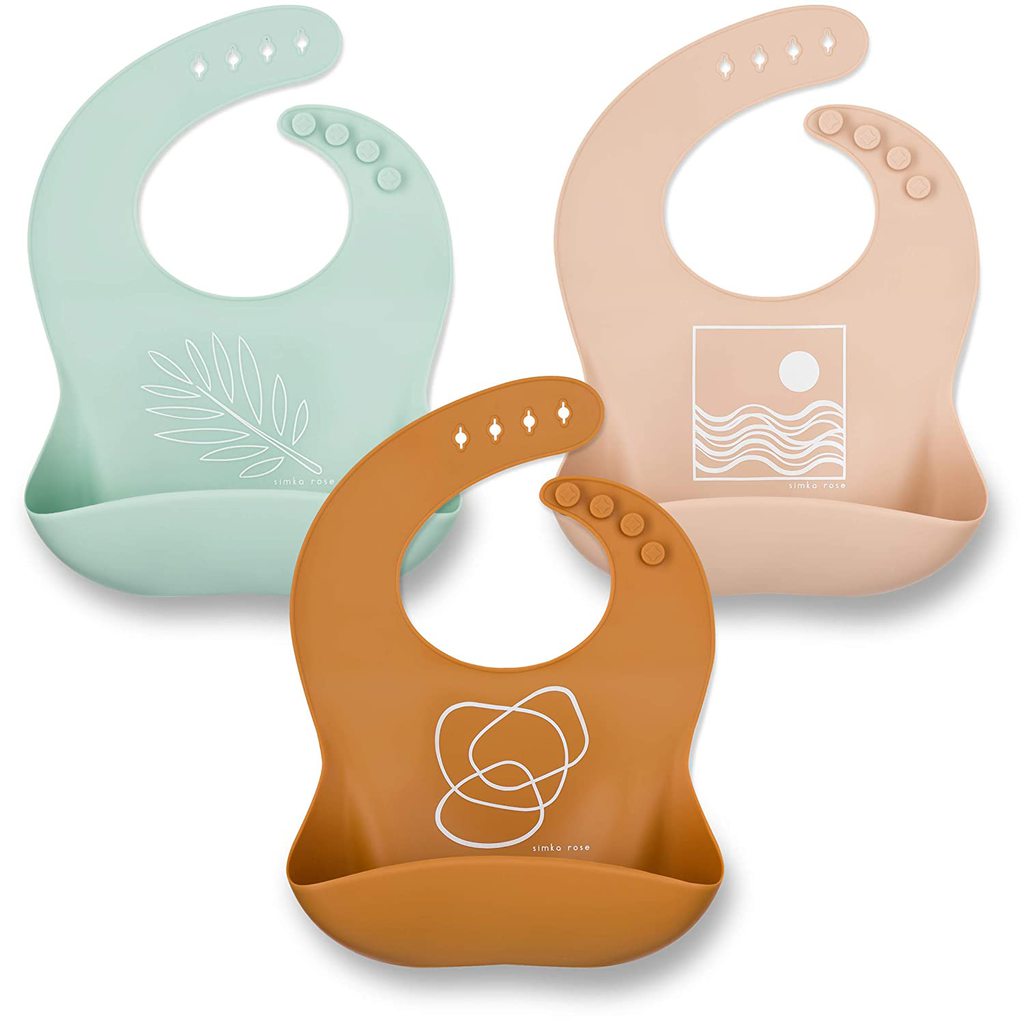
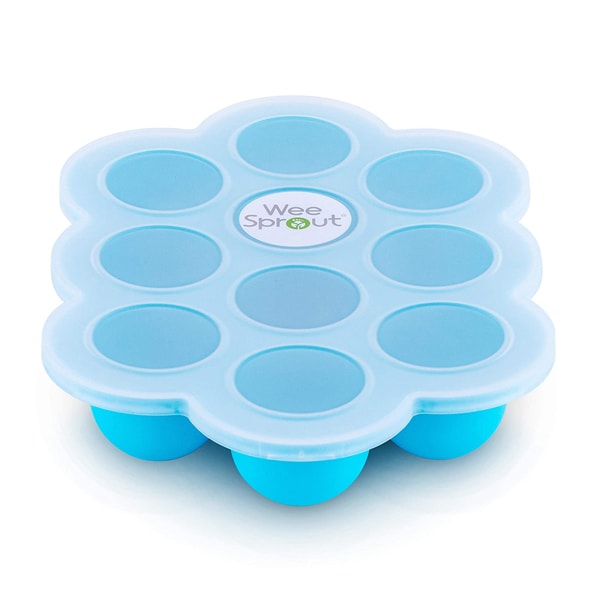
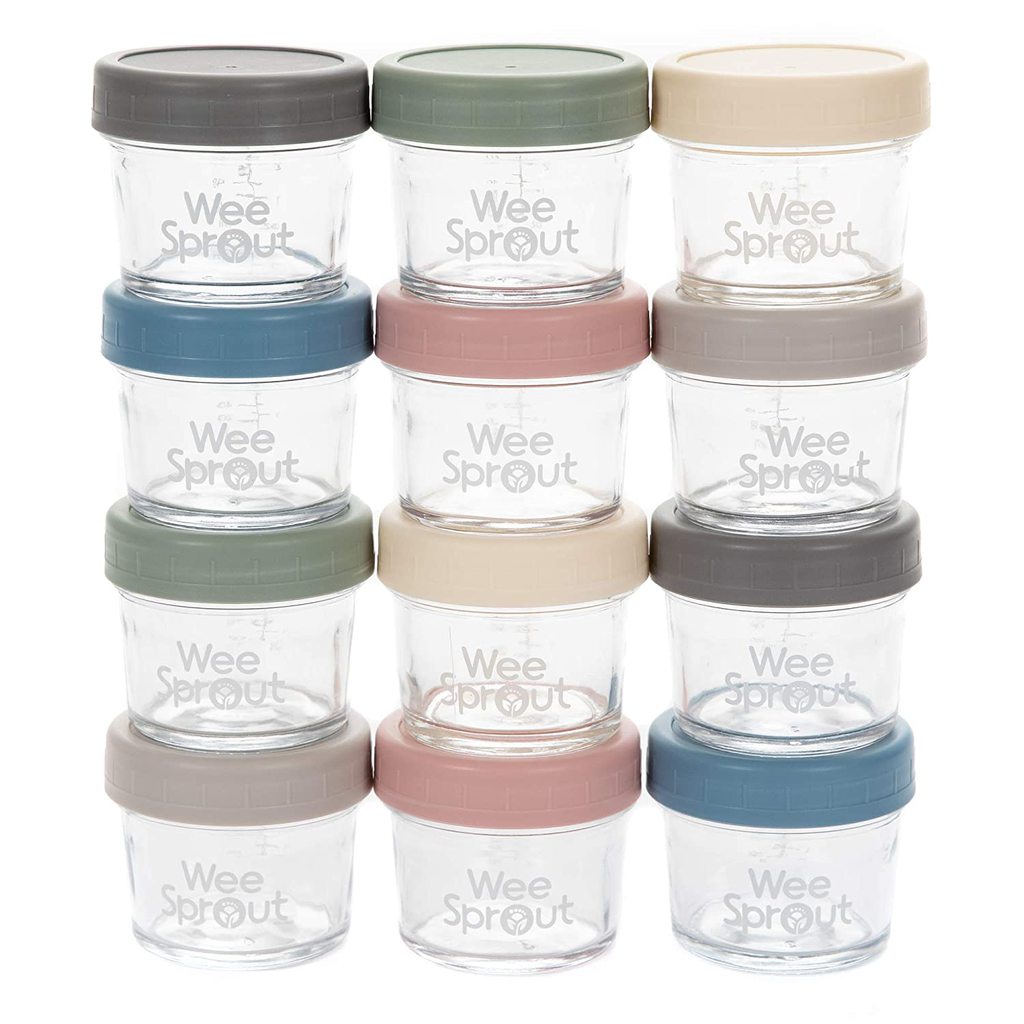
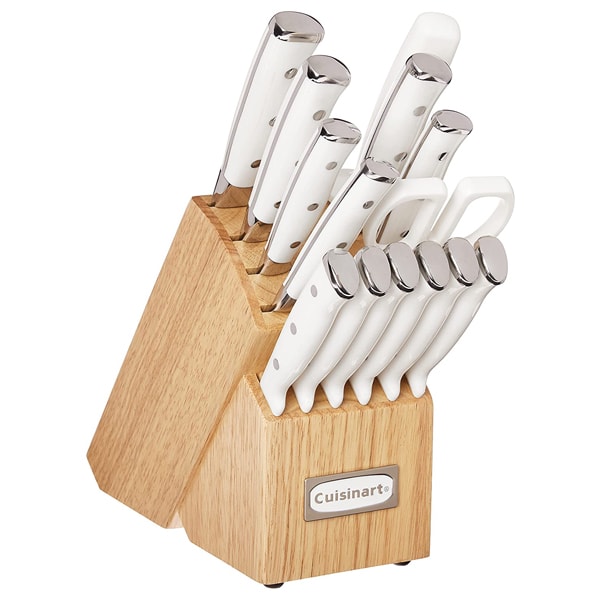
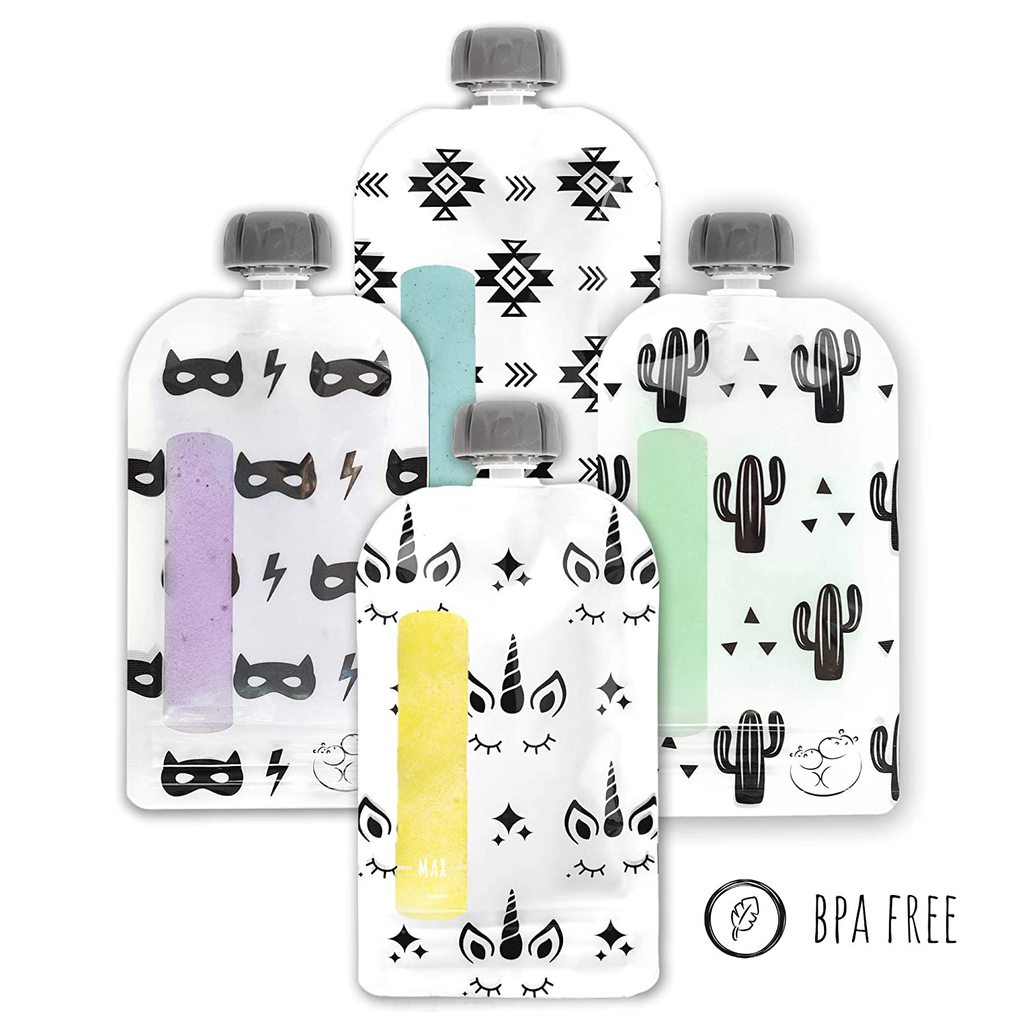
Tools Needed
These tools will make it a lot easier for you to make this healthy Sweet Potato puree. For more of my favorite kitchen tools make sure to check out my online shop.
- Baking Sheet
- Blender or Food Processor
- Knives
- Freezer Tray
- Storage Containers for Fridge
- Stasher Bag
- Bib with catch pocket
- Reusable pouches
Let’s Get Cooking
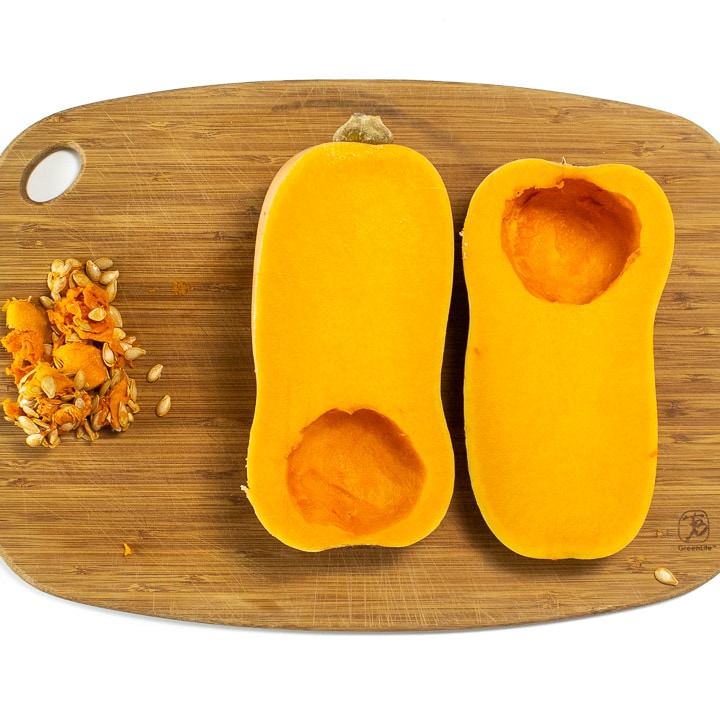
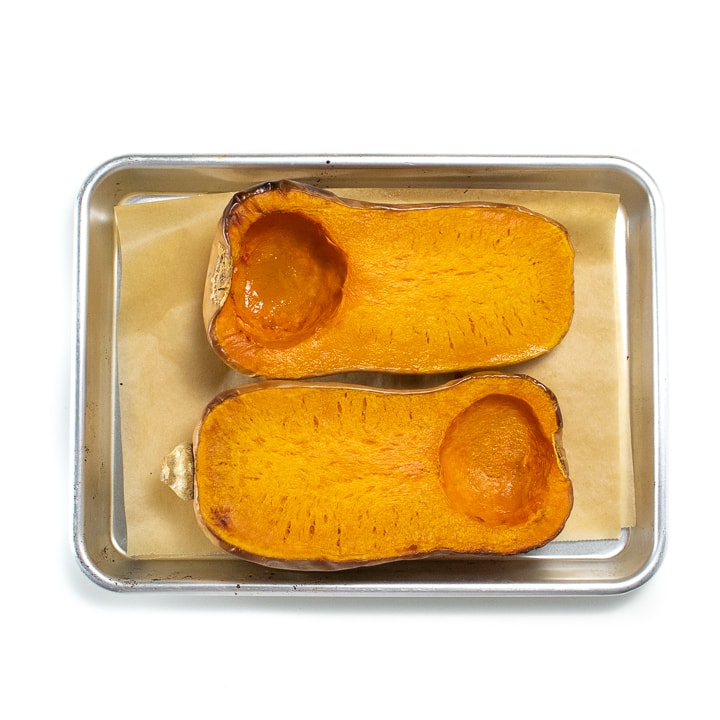
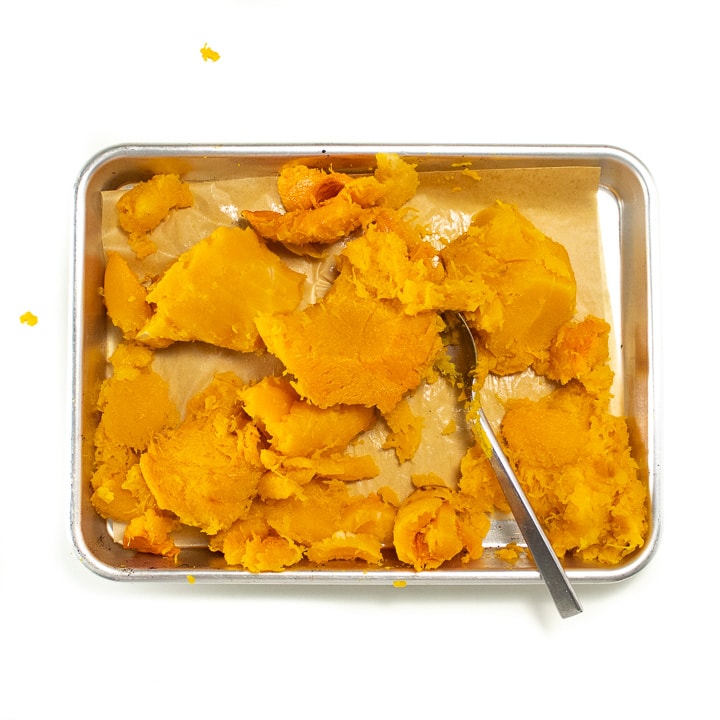
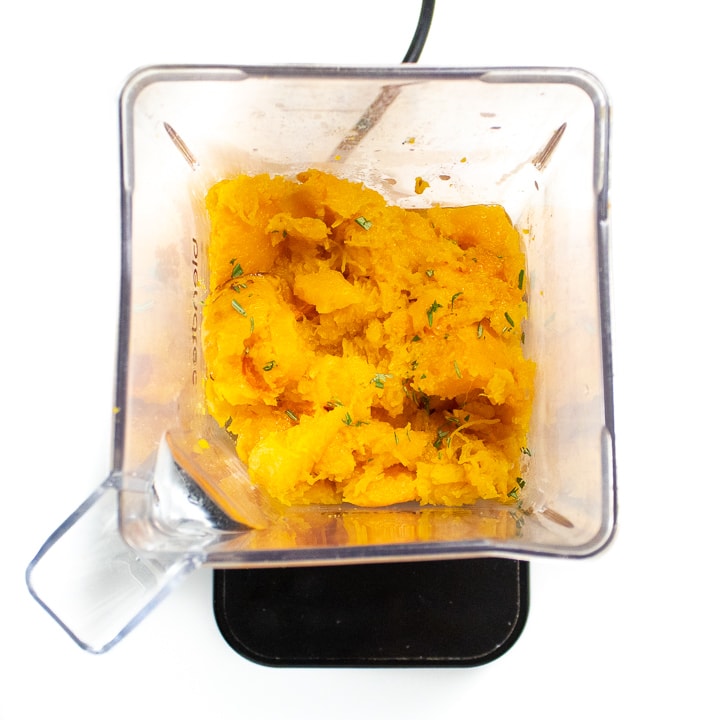
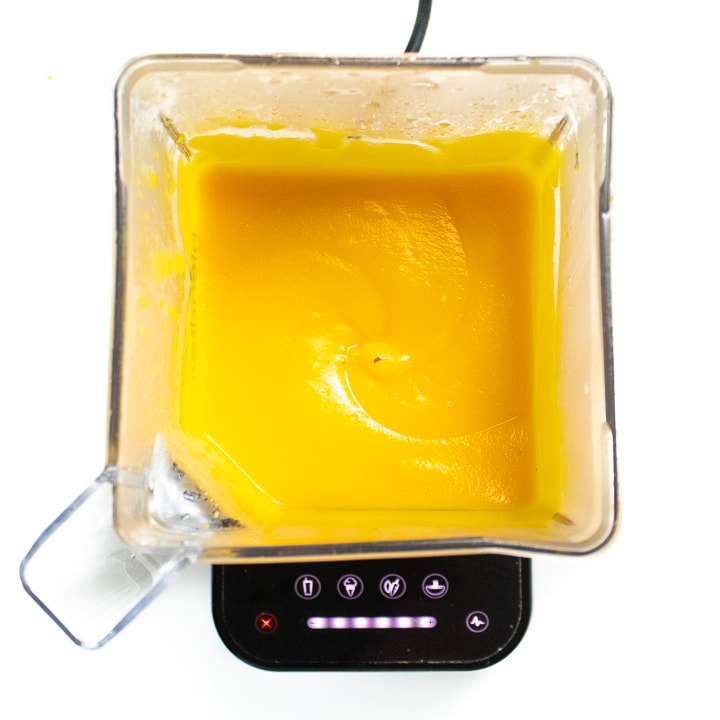
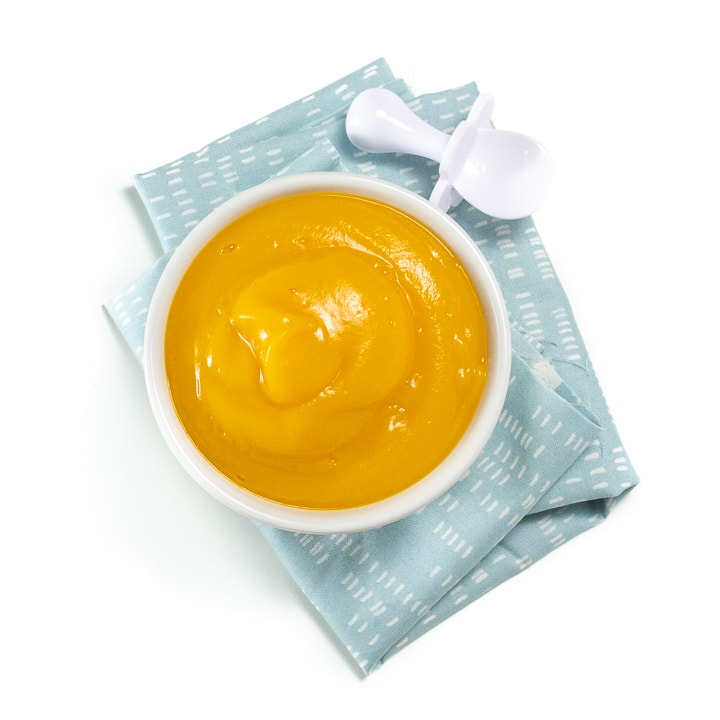
Other Cooking Methods
While I love the earthly, caramel flavor of roasted butternut squash, there are several ways you can cook butternut squash for baby food.
Steaming
Peel and roughly chop 1 butternut squash. Place the cubes into a steamer basket over 2 inches of boiling water for 10-15 minutes or until tender when pricked with a fork. Puree in a blender as directed below.
Boiling
Place 1 peeled and roughly chopped butternut squash into a medium saucepan, add enough water to cover the butternut squash, and bring to a boil. Reduce to simmer and cook for 7-10 minutes or until tender when pricked with a fork. Puree in a blender as directed below. Note that boiling the butternut squash decreases the nutritional value of the puree since a lot of the nutrients are thrown out with the water after cooking.
Saving Time Tip: Steaming or boiling butternut squash is a great method if you are using prepared or frozen butternut squash. I have found both peeled and cubed fresh or frozen butternut squash in my grocery store, which are both viable options if you are short on time.
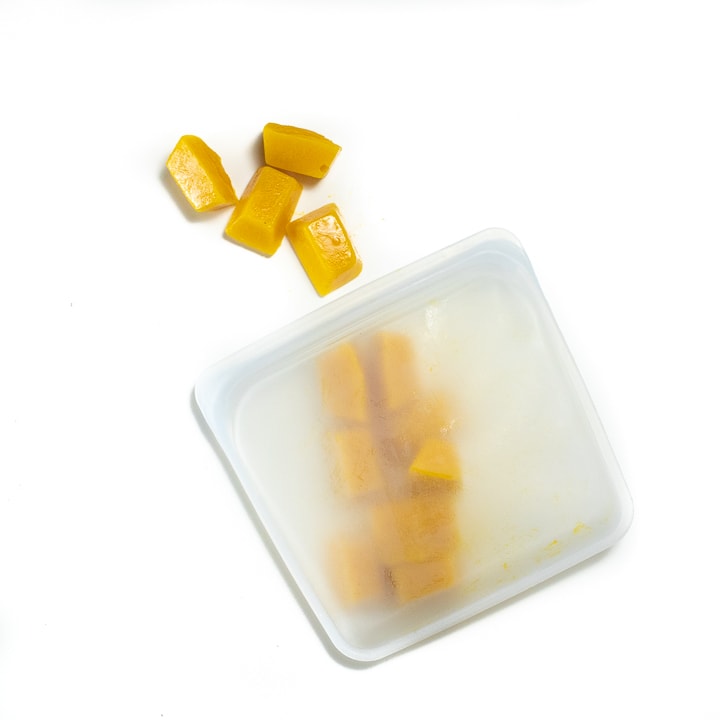
How to Store Butternut Squash Baby Food
Refrigerator
You can store this puree in an airtight container in the fridge for up to 4 days.
Freezer
This puree can be frozen for up to 4 months.
- Spoon puree into a freezer storage container– do not overfill.
- Place the lid on the storage container or cover with a piece of saran wrap, and label with the date and recipe name.
- Place the tray into the freezer and let it freeze completely — preferably overnight.
- Pop-out the baby food cubes and place them in a ziplock baggie or stasher bag. Don’t forget to relabel the baggie or stager bag for future reference.
Label Tip: Don’t forget to label your purees before you place them in the fridge or freezer with the name of the puree and the date you made it. Take it from me; by the end of the week, you will completely forget what is in your freezer and how long it’s been there. 😉

Great Butternut Squash Combination Purees
While this butternut squash puree is tasty, it’s also super easy to mix and match with other nutrient-dense baby food purees. So give these fun flavor combos a try!
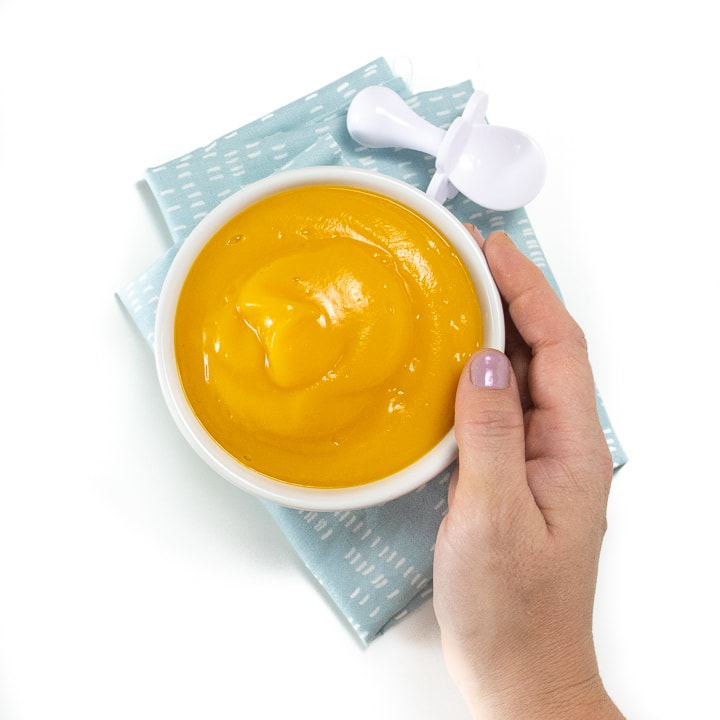
Puree Feeding Tips
- Follow your baby’s lead – when feeding purees from a spoon, sometimes there’s a tendency to keep offering bites past the point of your baby being full. Always follow baby’s cues for when they are done eating. Turning away from the spoon, closing her mouth, or pushing food away are all signs that baby is finished with the meal.
- Trial adding a little seasoning or spice to purees – babies like flavor! Or consider changing the temperature of purees from time to time, to slightly warmed or slightly chilled. Varying these aspects adds to the sensory experience!
- Place a small amount of puree on the tray during spoon feeding, so that your baby can dip their fingers or hands in the puree. Allowing baby to explore foods in this way helps them learn to self-feed and can help them be more willing to try new textures and foods in the future.
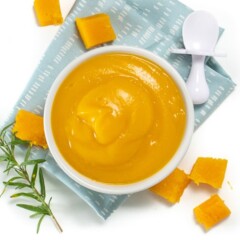
Get the recipe: The Best Butternut Squash Baby Food (Stage One)
Ingredients
- 1 butternut squash
- 1 tsp fresh thyme or rosemary, roughly chopped
- 1-2 tsp olive oil (optional)
- 1/2-1 cup liquid (water, fresh breast milk, formula, stock or bone broth)
Instructions
- Preheat: Heat oven to 450 degrees F. Line baking sheet with a silicone mat, tin foil or parchment paper.
- Prep: Cut butternut squash in half, deseed and place flesh side up, skin side down on the baking sheet. Optional – feel free to drizzle the squash with 2 teaspoons of olive oil for some added healthy fat.
- Roast: Place the baking sheet into the oven and bake for 45-60 minutes or until you can easily prick the squash with a fork.
- Peel: Let cool until you can handle the squash with your hands. Scrape the flesh off of the skin and place in a blender or food processor.
- Add Herbs: Add the thyme or rosemary to the blender.
- Puree: Turn on the blender or food processor and puree, adding liquid in 1/4 cup increments until you have the desired consistency. I had to add in 3/4 cup of water to my puree shown below.
- Eat: Serve or freeze for later.
Notes
Did you make this recipe?
Tag @babyfoode on Instagram and hashtag it #babyfoode!
Frequently Asked Questions
Can butternut squash be baby’s first food
Butternut squash can 100% be your baby’s first food if you want it to be. It is recommended to wait to introduce the top eight allergen foods to your baby once a few other well-tolerated foods have been introduced, but otherwise, foods can be introduced in any order so choose whatever you are most excited for your baby to have.
No, butternut squash is not a common allergen, however, as with any food, start with a small portion and be aware of any signs that might be an allergic reaction after introducing it.
Babies can have butternut squash as one of their first foods. When a baby can start on solids is determined by their own rate of development, which generally comes between 4-6 months of age. Some of the developmental milestones babies need to reach in order to start solids include: if your baby has solid control of their head and neck, if your baby has doubled in weight, and if your baby is reaching for or opening their mouth when you eat (see my guide here). Before you start your baby on purees, you should consult with your pediatrician to make sure your child is developmentally ready.
Yes! You can add in a pinch of chopped rosemary to this recipe, but feel free to use the following spices instead: basil, cilantro, ginger, nutmeg, coriander, mint, cinnamon, or mild curry powder (see quantity recommendations in the recipe card).
Tip on Spices: I always add spices or herbs to my baby food purees, but you can choose to leave them out in all of your baby food. You do you! Either way, this puree will surely taste amazing.
Butternut squash, though unlikely, may cause constipation in some babies, so avoid giving too much.

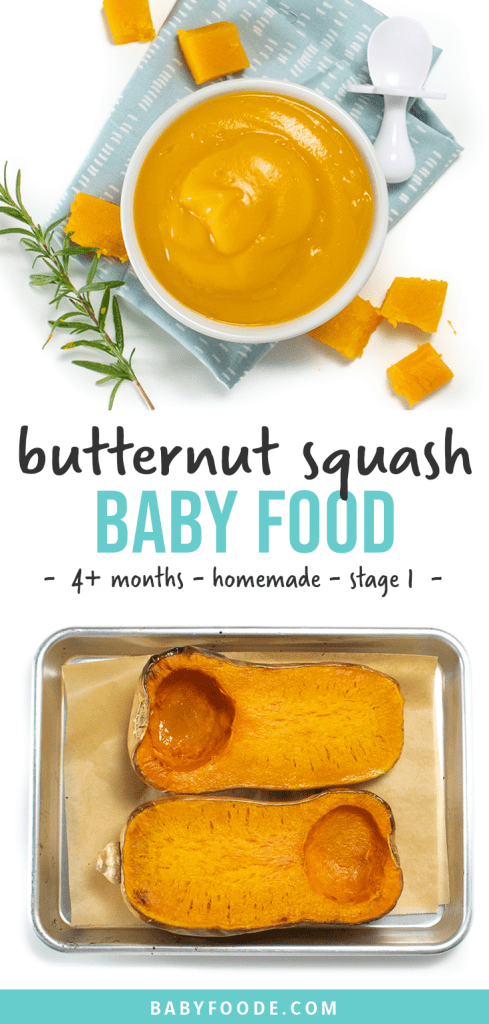
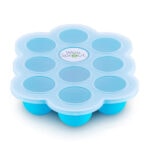
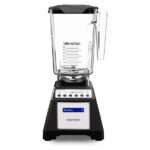
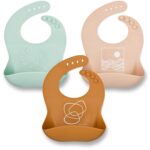
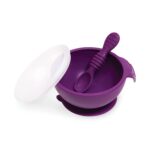
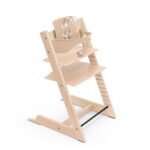
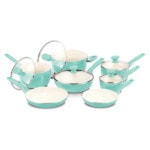
55 Comments on “The Best Butternut Squash Baby Food”
I steamed and blended my butternut squash super smooth, and my baby loved it. But when I thaw my frozen cubes the texture is really weird. Not smooth at all. I push down on it a ton of water comes out then it breaks into little chunks instead of being smooth. I’ve thawed two different ways with no success. Tips?
So sorry to hear this. Once the puree was completely thawed, and you stirred it, did the water incorporate back into the puree? You can try gently reheating it while stirring it to see if this helps. Let me know how it turns out.
How long to bake this in the oven if you have precut squash squares (not frozen) and at 350-375 degrees? My oven is old and can’t do 450,.. I can maybe do 400? Thanks soo much!
You can definitely roast the pre-cut butternut squash at 375-400 for 50-60 minutes or until fork tender. You can also steam them for 12-15 minutes in a steamer basket if that is easier for you.
This is hands down my daughter’s favorite vegetable. Her and I couldn’t get enough of this recipe. Highly recommend!
Thank you for your review of this recipe! I’m glad she enjoyed this puree so much.
This is great! If I’m wanting to incorporate breastmilk would it be best if I pureed this with breastmilk and then froze or should I just add breastmilk when I thought it out to serve? Thanks!
You can do it either way and depends on how much extra fresh breastmilk you have. Adding in a little breast milk when serving will require less at a time than pureeing the entire batch at once.
I made this for my 5 month old. I substituted the rosemary and thyme with Cinnamon and a pinch of Oregano and he absolutely LOVED it!
So happy to hear your little one loved this. Love your spice/herb substitution!
Love this recipe. It taste better than boiling the squash. Thank you for sharing !!
So glad you love this recipe!
This is my first time making baby food at home. I would have loved too for my 1st child but time didn’t really allow me to do so. Working from home, now it seems practical. It came out perfectly! I did use the olive oil but opted out of any spices. Of course I tasted it and it was a tad sweet and delicious. I would eat it myself instead of mashed potatoes!
I’m so glad you got the time (despite everything that goes along with working at home with little ones) to make this puree and love it as much as baby does!
I made this yesterday for my infant. I added 1/2 tsp minced fresh ginger, VERY YUMMY! So far all the recipes that I have tried from your website my infant loves so I am very happy with it. I will continue being a big fan of yours and will definitely recommend to other moms.
So glad baby enjoyed this recipe and the other recipes you have made. Go Mom for making your own baby food! Thank you for following along and spreading the word ❤️
If you’re using frozen butternut squash, is it okay to freeze it again after it’s been puréed (or any other frozen fruit/vegetable that’s been puréed)?
Yes, it is completely safe to do this.
Super simple and delish! I have tried a few recipes and they are winners, my grandson eats them up:)
So happy to hear this! You sound like an amazing grandma to make him homemade food!
This recipe looks really good and it is very healthy. My baby will definitely love this. Thanks for posting it!
Thank you so much for the recipe! So I thought making my baby food with organic veggies would be so much better than store bought. This recipe is easy and we know exactly what baby is eating! Thanks again!
So glad you like and found it an easy recipe to make!
All your recipes are amazing, but this one stood out! It could be that fall is upon us, and I am naturally craving fall foods, but it turned out so creamy and smooth, and the flavor is perfect! I am going to have to keep myself from eating it all when feeding my babe! Thank you so much for this recipe! It’s wonderful to know as well the vitamin and mineral content in your recipes. I find it super helpful and encouraging to continue making my own baby food!
So glad you both liked this one!! So glad I could be helpful on your baby food making journey.
Michelle,
Do different types of squashes need to be introduced separately for allergy testing? For instance could I use yellow squash and butternut squash in the same couple of days and test for overall squash allergies?
I would say that you would be fine with just introducing one type of squash for allergies.
xo, Michele
Michelle,
Do different types of squashes need to be introduced separately for allergy testing? For instance could I use yellow squash and butternut squash in the same couple of days and test for overall squash allergies?
I would say that you would be fine with just introducing one type of squash for allergies.
xo, Michele
Hello! I love ALL your recipes and LOVE all your Instagram posts! You make the best purees! My almost 6 month old has been eating plenty of vegetables over the past monthish… I did one week green, one week orange, then green. then orange and now we’re done! My question is, I want to make all these purees on your blog (under th4 month section) but should I be making apples for a few days, and then doing apples and cinnamon to test for allergies? He’s been good with all the stuff I’ve introduced him to already but I’m dying to add some herbs and more flavour to his food! I’m Indian and my grandparents used to feed us lentils and curry at 6 months so they’ve given me green light but I’m just an anxious first time mama!
Sorry, just saw this.
I love that you are introducing produce by color! What a great idea!!
Go ahead and add some herbs from the get go! Herb allergies are super rare so don’t feel anxious about it. They also help make the purees beyond yummy! Let me know how it goes.
xo, Michele
Hello! I love ALL your recipes and LOVE all your Instagram posts! You make the best purees! My almost 6 month old has been eating plenty of vegetables over the past monthish… I did one week green, one week orange, then green. then orange and now we’re done! My question is, I want to make all these purees on your blog (under th4 month section) but should I be making apples for a few days, and then doing apples and cinnamon to test for allergies? He’s been good with all the stuff I’ve introduced him to already but I’m dying to add some herbs and more flavour to his food! I’m Indian and my grandparents used to feed us lentils and curry at 6 months so they’ve given me green light but I’m just an anxious first time mama!
Sorry, just saw this.
I love that you are introducing produce by color! What a great idea!!
Go ahead and add some herbs from the get go! Herb allergies are super rare so don’t feel anxious about it. They also help make the purees beyond yummy! Let me know how it goes.
xo, Michele
First off- I am in love with your recipes and blog!
I think what I am most drawn to is the texture of your purees…is this achieved by your blender of the food processor?
I just can’t seem to get them quite that smooth
Megan
Hello Megan,
So glad you are here!!! Heart you right back!!
I use a blender for all of my purees and a food processor for my dips/nut butters/etc. But I have used the food processor before and it works almost as well. For the blender, I put in enough liquid (water, broth, formula, breast milk) until I have a small cyclone going, it really has to be able to get moving in there for the smooth puree. Hope that helps!
xo, Michele
First off- I am in love with your recipes and blog!
I think what I am most drawn to is the texture of your purees…is this achieved by your blender of the food processor?
I just can’t seem to get them quite that smooth
Megan
Hello Megan,
So glad you are here!!! Heart you right back!!
I use a blender for all of my purees and a food processor for my dips/nut butters/etc. But I have used the food processor before and it works almost as well. For the blender, I put in enough liquid (water, broth, formula, breast milk) until I have a small cyclone going, it really has to be able to get moving in there for the smooth puree. Hope that helps!
xo, Michele
Hi Michele!
Have you ever made this using frozen butternut squash? I bought some recently and want to try it but wasn’t sure how long I should roast for. Any tips would be greatly appreciated!
Thanks!
Hello Kelly,
I haven’t tried using frozen butternut squash. I try defrosting it first and then roasting it. Let me know how it works!
xo, Michele
Hi Michele!
Have you ever made this using frozen butternut squash? I bought some recently and want to try it but wasn’t sure how long I should roast for. Any tips would be greatly appreciated!
Thanks!
Hello Kelly,
I haven’t tried using frozen butternut squash. I try defrosting it first and then roasting it. Let me know how it works!
xo, Michele
I am just making my very first purees for my baby (5 1/2 months old). I made a full butternut squash and froze the puree. Can I add in a little spice to each meal or does it need to be done ahead of time? Also, can I used dried spices or do they need to be fresh?
Hello Kacey,
You can add spices either while pureeing or right before serving, I have done both and while I find I like adding the spice while pureeing so I don’t forget to add it, there isn’t much taste difference. If you are adding the spice before serving you just need a tiny pinch, after you heat the puree. You can use dried spices and for herbs I like fresh but if you can’t find any, dried is fine but you need to steam or cook them with the puree so they can open up a little and not be so tough in the puree. Hope that helps!
xo, Michele
I am just making my very first purees for my baby (5 1/2 months old). I made a full butternut squash and froze the puree. Can I add in a little spice to each meal or does it need to be done ahead of time? Also, can I used dried spices or do they need to be fresh?
Hello Kacey,
You can add spices either while pureeing or right before serving, I have done both and while I find I like adding the spice while pureeing so I don’t forget to add it, there isn’t much taste difference. If you are adding the spice before serving you just need a tiny pinch, after you heat the puree. You can use dried spices and for herbs I like fresh but if you can’t find any, dried is fine but you need to steam or cook them with the puree so they can open up a little and not be so tough in the puree. Hope that helps!
xo, Michele
Hi Michelle,
Do you have any tips for cutting the butternut squash? I can never get my knife through it!
Thanks,
Jen
Hello Jen,
I approach it like I approach the hacking open of a pumpkin. Arm up, killer grip, super force and a slight prayer!! LOL! They are a little tricky to say the least. Really, just take a very sharp, but short knife and prick it all the way into the skin and then just kinda saw through it all the way around.
Let me know if that helps!
xoxo,
Michele
I heard of someone putting it in the microwave for 2 minutes then cutting. Wish I had known that before I made mine. It’s supposed to make it just a bit softer but not cook it.
I cook the butternut squash whole, once cooked its really easy to cut! Then scrape the seeds out after its cooked.
I haven’t tried this method.. but now I am going to have to! Sounds super easy. Thanks for sharing.
Hi Michelle,
Do you have any tips for cutting the butternut squash? I can never get my knife through it!
Thanks,
Jen
Hello Jen,
I approach it like I approach the hacking open of a pumpkin. Arm up, killer grip, super force and a slight prayer!! LOL! They are a little tricky to say the least. Really, just take a very sharp, but short knife and prick it all the way into the skin and then just kinda saw through it all the way around.
Let me know if that helps!
xoxo,
Michele
I heard of someone putting it in the microwave for 2 minutes then cutting. Wish I had known that before I made mine. It’s supposed to make it just a bit softer but not cook it.